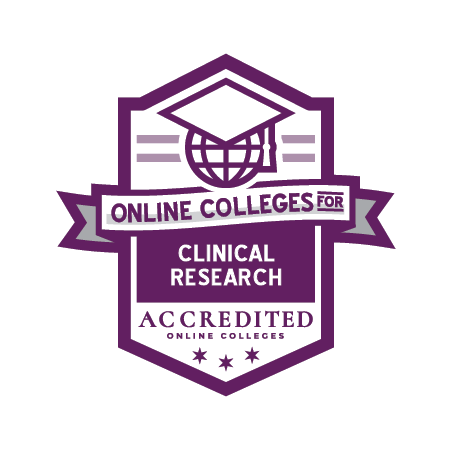School Finder


10 Accredited Online Colleges in Clinical Research
- Phone Vs. Text Vs. Email
- The Everlasting Lessons of Mr. Rogers
- Fake Schools, Fake Degrees: Avoiding Diploma Mills
- Silver Surfers: Internet Usage Among Older Generations
- Understanding Accreditation
- How To Get A Free Education
Accredited Online Program Rankings
- Accredited Online Colleges That Offer Free Laptops
- Top Accredited Online Colleges That Have Low Tuition
- Cheapest & Easiest Masters Degrees Online
- Cheapest Accredited Online Colleges for Diagnostic Medical Sonography
- Top Accredited Online Colleges for Early Childhood Education
- Top 30 Easiest Online PhD Programs
- Top Accredited Online Colleges for Physical Therapy
- Top Free Accredited Online Courses With Certificates
- Easiest Online College Programs for Undergrads
…View more
Accreditation Resources
- Accreditation List
- List of American Psychological Association (APA) Accredited Programs in Alabama
- Accredited Online Bible College Programs
- The Different Online Learning Modes For Online Degree Programs
Accredited Online Degrees
- The Importance of Online Accreditation
- The Difference Between Regional and National Accreditation
- The Advantages to Accredited Online Degree Programs
- An Overview of Accredited Online Associate Degree Programs
- An Overview of Accredited Online Bachelor Degree Programs
- An Overview of Accredited Online Master Degree Programs
- An Overview of Accredited Online Doctoral Degree Programs
- Engineering Degree Basics
Choose one of our top 10 accredited online colleges in clinical research for a career that is both personally and financially rewarding.

An online degree in clinical research allows you to gain the knowledge necessary to develop and conduct clinical research trials. Moreover, the knowledge and skills you gain enable you to work in various fields, from research ethics to research project management to regulating medical products.
In fact, clinical researchers are integral members of teams developing new medicines, devices, and services that save thousands of lives each year. With your contributions, you can make the world a healthier and safer place while improving the quality of life of untold patients around the world.
Featured Programs
See Also: 9 Tips For Balancing Work, Life, and Academics: Navigating the Challenges of Pursuing an Online Master’s Degree
What Will You Learn With a Degree in Clinical Research?
An online clinical research masters degree heavily focuses on the how’s and why’s of research. The programs listed below teach you the various steps in conducting a clinical research study. Just as important, you’ll learn about the ethics of conducting research.
While some people dismiss the importance of courses in ethics, medical research is full of examples of studies that caused physical, emotional, or psychological harm to research participants. Ethics courses ensure you understand the risks and potential harm that could result from clinical research.
Other topics you might study include:
- Regulatory management issues
- Regulatory development
- Clinical research methods and design
- Clinical research data management
- Clinical trial budgets and contracts
Most of the clinical research online programs on this list lead to master’s degrees, but there are a few certificate programs as well. While each program may offer different courses, many of the programs share a common core. Examples of specific courses you’re likely to see while enrolled in one of our top 10 accredited online colleges in clinical research include:
- Epidemiology and Biostatistics
- Research Methods
- Introduction to Drug Development
- Regulatory Affairs in Drug Development
- Regulatory Writing and Electronic Submissions
Keep in mind that some of these research degrees online allow you to choose a specialization in clinical research. With these programs, you’ll take additional classes to gain expertise in the specialization area. You will also be able to explore areas of interest through elective courses and clinical research with human subjects.
It should be noted that some online clinical research programs might have in-person requirements. You may have to participate in intensive on-campus coursework once or twice a semester. You might also need to complete practicum or internship experiences in which you gain real-world training while studying under the direction of an experienced clinical researcher.
See also: Top Nationally Accredited Online Colleges For Nursing
What are the Typical Admission Requirements for a Clinical Research Program?
The admissions requirements for these programs vary somewhat from one school to the next. For example, some schools might require that you have a bachelor’s degree in a research field. Others might require that you have a bachelor’s degree in any field.
Additionally, some schools might have more stringent academic requirements. For example, one university might require applicants to have a 3.25 undergraduate GPA, while other programs might only require a 3.75 GPA. Some programs may require you to take specific undergraduate classes, like advanced statistics or research methods courses. You may need to provide evidence of working on a relevant research project as well.
Despite these and other differences, there are some common graduate program admission requirements for enrollment in clinical research. These might include:
- Submitting official transcripts from all colleges and universities you’ve attended
- Providing a personal statement or a statement of career goals
- Providing letters of recommendation from academic and/or professional references
- Completing an interview with the academic program director
Additionally, you may have to complete a readiness assessment that gauges your understanding of critical clinical research competencies.
See also: Accredited Online Colleges in Public Health
What Are the Best 10 Accredited Online Colleges in Clinical Research?
Accredited Online College uses the most recent data from the Department of Education’s National Center for Education Statistics to develop the rankings you see below. Each program is scored individually. It’s then compared to all other universities offering that degree to determine the final score you see by each ranking.
Accredited Online College considers several factors for these rankings. These include the program’s affordability, the student-to-faculty ratio, and the number of on-campus and online programs. For more information, see our methodology page.
Let’s get to our list of the clinical research degree online options awaiting you!
See Also: Financial Aid Tips for Online College
1. The Ohio State University

At number one on our list of clinical research degree programs is the Master of Clinical Research from The Ohio State University.
This program is available through the school’s College of Nursing and is offered entirely online. This program stands out from the pack because the coursework is multidisciplinary and is taught by instructors in both the College of Nursing and the College of Pharmacy. This interdisciplinary approach gives you a broader base of understanding of clinical research.
Some of the courses you’ll take include:
- Fundamentals of Medical Product Development and Regulation Affairs
- Responsible Conduct of Research
- Clinical Research Study and Site Management
- Clinical Research Design and Methods
Many courses in this program are asynchronous, so you can attend to your studies when it’s convenient for you.
You can specialize your coursework by focusing on either the Clinical Research Management Track or the Regulatory Affairs track.
The Clinical Research Management Track focuses on teaching you the processes involved in conducting and managing clinical research. Upon completing this track, you will be ready for employment as a clinical research coordinator or clinical research associate.
Alternatively, the Regulatory Affairs Track is geared toward online students who want to focus on the regulation of research. You’ll also focus on the compliance and communication aspects of clinical research.
See Also: Accredited Pharmacy Schools Online
2. University of North Carolina Wilmington

If you’re searching for a career in clinical research but don’t want to spend your days in the laboratory, then the Master of Science in Clinical Research & Product Development from the University of North Carolina Wilmington may be the perfect degree for you.
This program was designed for people who want to work in management and oversight positions in clinical research. Although you won’t be required to participate in extensive laboratory experiences to graduate, you will be taught the research process and stages involved by examining a study from start to finish.
Twelve courses, which include the capstone course necessary for graduation, compose this master of clinical research online . Classes in this program include:
- Clinical Research Monitoring and Ethics
- Advanced Scientific Writing and Interpreting Medical Literature
- Clinical Research Trial Design and Data Management
- Regulatory Affairs and Quality Management
Many other courses are required, including those focusing on pharmacology, ethics, and current issues in regulatory development and management.
UNC’s admission team is looking for applicants with a BA or BS in life science, health care discipline, or mathematics/statistics. You must also submit supporting documents with your application, including a resume or curriculum vitae, a personal essay, and three letters of recommendation.

3. Arizona State University-Tempe

The Online Master of Science in Clinical Research Management from Arizona State University focuses on providing a top-notch education. You get that education with built-in flexibility to accommodate your busy work and home life.
This master’s degree program includes 11 courses equaling 33 credit hours of study. Each class lasts 7.5 weeks. This accelerated format positions you to take fewer classes at a time yet still complete your degree on a reasonable timetable. In fact, you might be able to finish this master’s program in just one year.
You’ll take many different courses in this program, including:
- Clinical Research Data Management and Technology Implementation
- Fundamentals of Regulatory Affairs
- Scientific and Research Review Boards
- Responsible Conduct of Clinical Research
- Drug Discovery, Development, and Regulations
Furthermore, you must complete a capstone project during the final term of the program. The project is a cumulative learning experience that combines the knowledge and skills you’ve learned throughout the program to address a crucial issue in clinical research. In some cases, your capstone project might be published in relevant journals and other publications.
Competitive applicants must already have an undergraduate or graduate degree. Furthermore, anatomy, physiology, and medical terminology coursework are highly recommended
ASU provides opportunities for you to connect with future employers. This might make it easier to land your first job after graduation.
4. St. Cloud State University
Success in a career demands more than just the technical knowledge required to prove competence. Your success also requires the leadership and communication skills that distinguish a mediocre hire from a company superstar.

St. Cloud State University appreciates this distinction, which is why it created the Master of Science in Applied Clinical Research. As a student in this program, most of your education will be on the technical aspects of clinical research. However, the school also prepares you to thrive in leadership positions in clinical research.
This online clinical research degree is the only clinical research program on this list geared specifically toward the use of medical devices. With specialization in specific areas of clinical research comes the opportunity to land your ideal high-paying job. You’ll explore topics like:
- The history of protections and regulations
- The logistical and scientific requirements of clinical research
- Ethical practices in clinical research
- Site management of clinical research
- Designing medical device clinical trials
This program features two start dates each year: one in the spring and one in the fall. As a student of this university, you’ll be able to select either a full- or part-time route to complete your degree.
5. Eastern Michigan University

Eastern Michigan University offers two ways in which you can gain expertise in clinical research: one is through a Graduate Certificate in Good Clinical Practices, and the other is through a Master of Science in Clinical Research Administration.
The graduate certificate consists of 15 credit hours of coursework. If you opt for this track, you’ll take classes such as:
- Clinical Study Administration I & II
- Advanced Topics in Clinical Study Management
The Master of Science in Clinical Research Administration program comprises 34-35 credit hours of coursework, with 19 credit hours making up the core. The required coursework includes many of the same classes as the graduate certificate, along with:
- Ethical Issues in Clinical Research
- Regulatory Affairs in Drug Development I
- Graduate Seminar in Drug Development
This degree allows you to choose between a thesis and a research project option. The thesis option is six credit hours and takes place during your final year in the program. The research project is worth four credits and also takes place during the final year.
6. University of Texas Rio Grande Valley

The Master of Science in Health Sciences from the University of Texas Rio Grande Valley has a concentration in Clinical Laboratory Sciences. This online program was created specifically with certified medical laboratory scientists and medical technologists in mind. Most students need only around one year of full-time study to complete the program. It’s a fast-track way to advance your career.
This MS degree includes 36 credit hours, with courses lasting around seven weeks. Classes you’re likely to take in this clinical research program online include:
- Research in Health Sciences
- Health Computer Information Systems
- Health Care Policy, Organization, and Financing
- Introduction to the Health Care System and Quality Improvement
- Professional Proposal Writing
What’s more, the tuition is reasonably priced at $444 per credit hour, which means that the degree, in total, is expected to cost students just under $16,000.
You must already have a bachelor’s degree from a regionally-accredited institution to apply. You must also have a 3.0 GPA or higher for your last 60 credits of study.
7. Rutgers University

The Department of Health Informatics at Rutgers University offers a Master of Science in Clinical Research Management with hybrid learning opportunities. Some courses are offered online, while others may require attendance in person.
This program offers three concentration areas. These include:
- Clinical Research Management
- Drug Safety and Pharmacovigilance
- Academic Clinical Research Management
In any case, this is a 36-credit-hour, multi-disciplinary program. Depending on your chosen concentration area, you will need anywhere from 16 months to three years to complete your studies. During that time, you will explore topics like:
- Scientific Concepts and Research Design
- Clinical Trial Operations
- Study and Site Management
- Communication and Teamwork
- Ethical and Participant Safety Considerations
Each course included activities that challenge you and engage you in the content. With experiential learning activities and expert professors, you’ll have many opportunities to expand your understanding of critical issues in clinical research.
Moreover, this program follows the cohort model, so you’ll move from one class to the next with the same group of classmates. This model facilitates a creative and supportive learning environment while bolstering your connections with peers.
8. Drexel University

Drexel University’s Master of Science in Clinical Research is specifically designed for health professionals like fellows, residents, and clinicians. Over the course of the program, you’ll take an interdisciplinary course load taught by attorneys, researchers, administrators, and other professionals. Though most students need two to three years to complete the program, you can take as many as seven years to finish.
You’ll take 12 courses for a total of 36 credits. These courses may include:
- Epidemiology
- Fundamentals of Compliance
- Innovative Product Development
- Compliance and Monitoring Issues
- The History of Misconduct in Biomedical Research
Unlike many programs in this field, this one does not require a thesis or internship. And since it’s an online program, there are no residency requirements to complete on-campus coursework.
However, you must complete a real-world clinical experience. This requirement involves mentored research with a doctoral-level advisor. Their guidance will assist you in developing the necessary skills to guide and conduct clinical research of your own.
9. George Washington University

The Bachelor of Science in Health Sciences degree from George Washington University is a 120-credit program that’s available entirely online. As part of this clinical research associate degree online , you’ll take 17 core courses worth 51 credits. You must also take nine credits of electives in clinical research for a total of 60 credits needed to complete the major area studies.
Below is a sample of courses you will take:
- The Business of Clinical Research
- Pathophysiology
- Processes of Clinical Research
- Introduction to Statistics for Health Science
- Introduction to Regulatory Affairs
Since this is a fully online program, you should be self-directed and have the self-discipline required to stay on top of your studies. Likewise, you should be interested specifically in working in the clinical trials industry.
You must have a minimum 2.5 GPA for your undergraduate studies to apply. You must also submit a resume or curriculum vitae, a personal statement detailing why you want to pursue this degree, and at least one letter of recommendation.
10. Nova Southeastern University

The last entry in our ranking of the best online clinical research programs is from Nova Southeastern University.
If you’re a healthcare professional already involved in clinical research and want to gain the knowledge and expertise that a master’s degree can provide, then this Master of Health Science with a Clinical Research Concentration is the program for you. To graduate with this master’s degree, you are required to complete 39 credit hours of coursework.
The core curriculum of this program consists of 12 credit hours of classes like:
- Current Trends and Cultural Issues in Health Care
- Writing for Allied Health Professionals
The Clinical Research Concentration requires you to take nine specialty and practical courses for a total of 27 credit hours of clinical-research-specific coursework. These courses include:
- Qualitative Research Methods
- Quantitative Research Methods
- Research Ethics
- Applied Statistics
Furthermore, you must complete a developmental research project. This project allows you to demonstrate your clinical research skills in oral and written forms. A large component of this project is thesis research, which you’ll primarily do during the program’s final year. You must successfully defend your thesis to your committee to graduate.
Frequently Asked Questions
What kind of job can i get after completing a degree in clinical research .
So, you’re wondering what kind of job you’ll be qualified to apply for once you’re finished with your clinical research degree? This is a great starting place when deciding if a clinical research degree is even right for you! Various opportunities are available if you decide to put your time and money into earning one of these degrees.
The most commonly traveled route for graduates of clinical research degree programs is to become a clinical research associate or clinical research coordinator. Clinical research associates are part of the research team that is involved in various aspects of conducting clinical research. This includes gathering, selecting, and educating research participants and filling out various paperwork for running one of these trials.
Clinical research coordinators perform some of the same jobs as clinical research associates. They are more responsible for coordinating the various steps of research studies, which often happen simultaneously. Clinical research coordinators may also monitor others involved in the study to ensure they comply with the rules, regulations, and guidelines.
Many clinical research coordinators and clinical research associates have a background in the healthcare field. For example, nursing is a common background for these positions, as are other healthcare professions. Healthcare provides a solid background for clinical research studies because they involve the health and well-being of people.
With that said, laboratory and study sites are not the only places where you can put the knowledge and skills you learn in your clinical research degree to work. After graduation, you might work in a management position at a pharmaceutical or medical device company. Individuals with knowledge of the clinical research process are ideally placed to make decisions for the future directions of these companies.
Do I Need a Master’s Degree to Be a Clinical Researcher?
Though a master’s degree won’t hurt, it isn’t totally necessary to pursue a career in this field, either. As discussed in the next section, your education level strongly influences how much money you make. Yet, a master’s degree or doctorate isn’t required for all clinical research positions.
In fact, most clinical research jobs require a bachelor’s degree – about 60% . Some jobs in this field, like entry-level positions, don’t even require that. You might find a starter position with an associate’s degree, a certificate, or even some combination of college courses and a certificate.
However, these entry-level jobs are just that – introductory positions where you can get experience as you complete the educational requirements for a more advanced degree. If you want to keep advancing your career, you must continue pursuing additional education and training.
What Kind of Salary Can I Expect After Earning a Clinical Research Degree?
The second question you may be asking yourself, and for some, this may be the first, is, “How much can I earn with a clinical research degree?” Simply put, if you complete an online clinical research program , you might be well compensated for the time and effort associated with earning your degree.
Clinical research associates and clinical research coordinators, most of whom have bachelor’s or master’s degrees and work for a clinical research organization, earn a jaw-dropping $137,900 per year. Yes, you read that correctly – these individuals earn, on average, around $66.30 per hour. Even more astounding is that these are median salaries, meaning many individuals earn significantly higher salaries.
Many factors can affect the salary you can expect to earn. This includes your level of experience, the company at which you’re employed, and the state in which you reside. Your level of education also matters.
For example, if you get an online PhD in clinical research , you can likely command more money due to a higher level of education (though a doctoral degree alone isn’t a guarantee of a higher income). As another example, clinical research associates that work for government agencies, like public health offices or the Federal Drug Administration (FDA), tend to make less than those in the private sector, like research organizations.
According to O*NET OnLine, there are currently nearly 79,000 individuals employed in these positions. Additionally, the profession is expected to grow at an average rate of 4%-7% within the next ten years. This means that as you progress through your program of study, there should be jobs available upon your graduation.
Alternatively, if you decide to use your newly acquired skills to work for pharmaceutical companies, you’ll likely earn nearly $95,000 per year. Like clinical research associates, research coordinators, and other clinical research professionals, various factors go into the earning potential of this job, like location and the medical products you sell.
There are currently an estimated 280,700 individuals working as technical and scientific product sales representatives, and the profession is expected to grow at an average rate of 4%-7% in the next decade.
If you decide to enter management and eventually work up to a chief executive position, you’ll also have a bright financial outlook. Chief executives go by a variety of titles, including:
- Chief Operating Officer (COO)
- Chief Nursing Officer (CNO)
- Chief Financial Officer (CFO)
- Chief Diversity Officer (CDO)
- Chief Executive Officer (CEO)
Almost every company features these positions, and people who fill these roles are ultimately responsible for the direction and management of the organization.
With substantial responsibility often comes substantial compensation. The median income for chief executives is just under $179,520 per year. It’s estimated that around 283,900 people hold these positions. However, these careers may be more challenging than the others listed above. For example, these jobs are expected to decrease by about 2% in the next ten years.
IIf you want to pursue higher education, check out the Top Easy Accredited Online Master’s Programs and the 30 Accredited Online Colleges For Nursing .

IMAGES
VIDEO